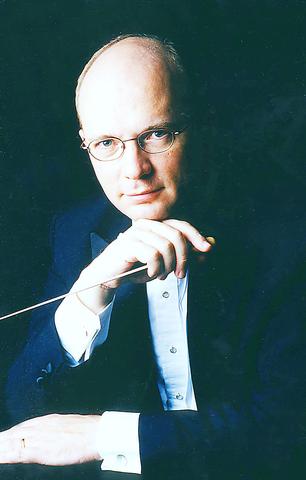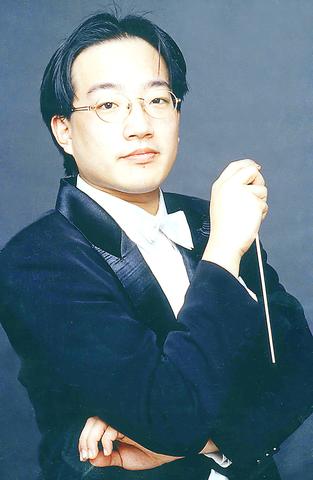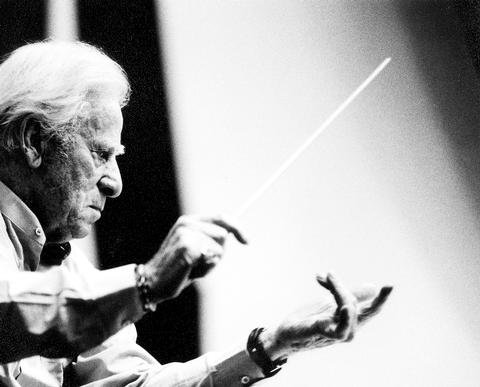In 1985, Henry Mazer, then guest conductor at Chao Yun Ensemble (
Led by Mazer, the group's music director and conductor, Chao Yun changed its name later the same year to Taipei Sinfonietta. In 1991, in order to enlarge the group's repertoire, he pushed through the groups restructuring, turning it into the Taipei Sinfonietta and Philharmonic Orchestra (台北愛樂室內及管弦樂團).
The orchestra later became the first Taiwanese group to perform at the world-renowned Grosser Musikvereinssaal in Vienna and the Boston Symphony Music Hall, where it won worldwide acclaim. This Sunday night, the orchestra will set another record by being the first orchestra in Taiwan to hold its 100th concert. None of this would have happened without Mazer.

PHOTO COURTESY OF TSPO
Born in Pittsburg, Mazer started conducting at age 17 in his community choir. His performance drew the attention of master conductor Franz Riener, who later became his teacher. In 1966, he assisted William Steinberg, then conductor of the Pittsburg Symphony Orchestra. When Steinberg fell ill in 1970, he substituted for him at Carnegie Hall, performing with pianists Rudolf Serkin and Artur Rubinstein, vocalist Marian Anderson, guitarist Andres Segovia, violinist Isaac Stern and so on, winning accolades from music critics.
He showed his full talent in the Chicago Symphony Orchestra, where he worked as assistant conductor and also trained musicians at the behest of conductor Sir Georg Solti. In Chicago, he devoted himself to music education on the university campus before moving to Taiwan. Before leaving, Mazer told the media in Chicago that "before coming to Chicago, I strived to be an orchestra builder. During my time with the Chicago Symphony Orchestra I tried to be an educator. These are the two fields in the music industry that intoxicate me most. In Taiwan, I'm going to do these two things at the same time." To commemorate Mazer's contribution to the classical music scene in Chicago, Harold Washington, then the city's mayor, proclaimed May 24 "Henry Mazer Day."
It's more than the voice from the gods, that led Mazer stay in this country for some 17 years.

PHOTO COURTESY OF TSPO
"Maestro Mazer often says that he's spent the best time of his life in Taiwan. Here, everyone he has worked with becomes his friend. He is also friends with his students. His friendship with so many people has kept him in Taiwan," said Lin Tian-ji (
According to Lin, Mazer has a unique way of teaching conducting. "In his point of view, being a gentleman and being a good conductor are inseparable. Once he was in my car when I forgot to let a pedestrian cross the street first. He got so angry he kept lecturing me all the way. ... His point is that if there are problems in your character, there must be problems in your conducting," Lin said.
Mazer's strictness probably comes from his great expectation from his students. His first few encounters with musicians in Taiwan convinced him that they were quick, responsive, sensitive to notes and their performance on strings were particularly delicate. For Mazer, they are the kind of musicians, that, given proper training, would be world-class performers.

The fruits of his training will show at Sunday's tribute concert through the conducting performances of Lin and John van Deursen, Mazer's student of 12 years.
The music director of the recently-founded Taipei Jazz Music Group and TSPO's principal guest conductor, Van Deursen attributes the success of his conducting career to Mazer's teaching. "Mazer's ideas about conducting influenced me a lot. He never gestures wildly when he is conducting. This is because he wants to show more of the composer, but less of the conductor. Instead of personal interpretation of the music, he wants to present what the composers really wanted when they wrote the music," he said.
"Maestro Mazer's other idea is his respect for the musicians. He never tries to make the music sound perfect by going over the same number again and again or asking the musicians to play with mechanical precision. Rather, he goes for the big idea and creates naturally flowing music," Van Deursen added.
At Sunday's concert, the orchestra is going to perform three numbers of significance in the group's history. Grieg's Aus Holbergs Zeit Op. 40 was the piece the orchestra performed in their first live television broadcast. The international critical acclaim for their recording of Elgar's Introduction and Allegro won the group their first chance to perform abroad. The two pieces will be performed with John van Deursen. Lin Tian-chi, will conduct the third number, Mahler's Symphony No. 1, Titan. The large-scale orchestration required by the number shows that the group has successfully transformed into a philharmonic orchestra. More importantly, it was chosen for its title that appropriately expresses the orchestra's gratitude and reverence for their music director. As he is recovering from a recent stroke, Mazar himself will likely not be in attendance.

Nine Taiwanese nervously stand on an observation platform at Tokyo’s Haneda International Airport. It’s 9:20am on March 27, 1968, and they are awaiting the arrival of Liu Wen-ching (柳文卿), who is about to be deported back to Taiwan where he faces possible execution for his independence activities. As he is removed from a minibus, a tenth activist, Dai Tian-chao (戴天昭), jumps out of his hiding place and attacks the immigration officials — the nine other activists in tow — while urging Liu to make a run for it. But he’s pinned to the ground. Amid the commotion, Liu tries to

The slashing of the government’s proposed budget by the two China-aligned parties in the legislature, the Chinese Nationalist Party (KMT) and Taiwan People’s Party (TPP), has apparently resulted in blowback from the US. On the recent junket to US President Donald Trump’s inauguration, KMT legislators reported that they were confronted by US officials and congressmen angered at the cuts to the defense budget. The United Daily News (UDN), the longtime KMT party paper, now KMT-aligned media, responded to US anger by blaming the foreign media. Its regular column, the Cold Eye Collection (冷眼集), attacked the international media last month in

A pig’s head sits atop a shelf, tufts of blonde hair sprouting from its taut scalp. Opposite, its chalky, wrinkled heart glows red in a bubbling vat of liquid, locks of thick dark hair and teeth scattered below. A giant screen shows the pig draped in a hospital gown. Is it dead? A surgeon inserts human teeth implants, then hair implants — beautifying the horrifyingly human-like animal. Chang Chen-shen (張辰申) calls Incarnation Project: Deviation Lovers “a satirical self-criticism, a critique on the fact that throughout our lives we’ve been instilled with ideas and things that don’t belong to us.” Chang

Feb. 10 to Feb. 16 More than three decades after penning the iconic High Green Mountains (高山青), a frail Teng Yu-ping (鄧禹平) finally visited the verdant peaks and blue streams of Alishan described in the lyrics. Often mistaken as an indigenous folk song, it was actually created in 1949 by Chinese filmmakers while shooting a scene for the movie Happenings in Alishan (阿里山風雲) in Taipei’s Beitou District (北投), recounts director Chang Ying (張英) in the 1999 book, Chang Ying’s Contributions to Taiwanese Cinema and Theater (打鑼三響包得行: 張英對台灣影劇的貢獻). The team was meant to return to China after filming, but